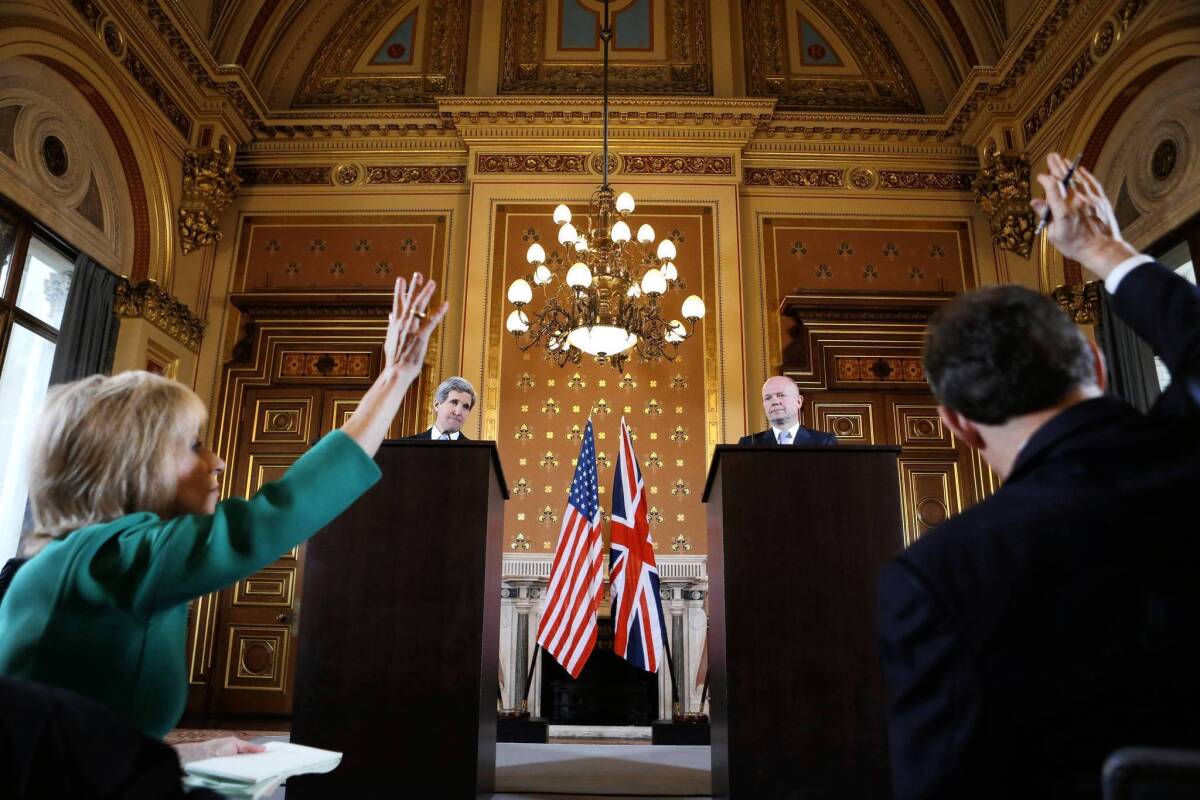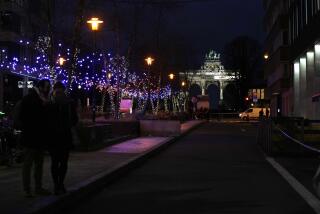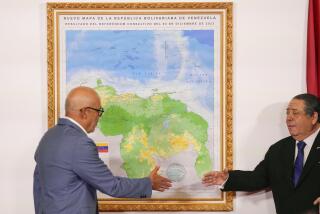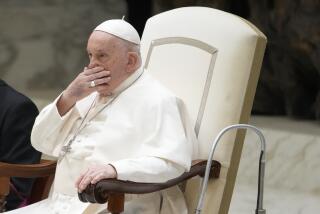Syria opposition will reportedly attend Rome meeting

LONDON — Syrian opposition members have reportedly reversed their decision to boycott a meeting in Rome on Thursday with Secretary of State John F. Kerry and other world leaders, averting a potential embarrassment for Kerry on his first overseas trip as top U.S. diplomat.
Separately, Syria’s foreign minister said in Moscow on Monday that the government was prepared to talk with the opposition, including armed rebels.
The twin developments came as Kerry arrived in London on the first leg of a nine-nation tour. They also were set against a backdrop of continued violence in Syria, where a large explosion shook the capital, Damascus, late Monday, followed by smaller blasts and sounds of gunfire. As many as 70,000 people have died in the almost two-year conflict, according to the United Nations.
Walid Bunni, a spokesman for the Syrian National Coalition, told Al Arabiya television Monday that the members of the umbrella group had changed their minds about boycotting the meeting of the so-called Friends of Syria, following promises from U.S. and allied figures that they would increase aid to the rebels. Bunni said the rebels would go to Rome “and we will see if the promises are different this time.”
Some members of the opposition umbrella group said they believed they should not give their tacit blessing to the meeting when world powers had repeatedly failed to do enough to help end their fight against the government of Syrian President Bashar Assad. The rebels have been especially bitter that the West has not provided them with the heavier weapons they say they need to break the military standoff.
In Moscow, Syrian Foreign Minister Walid Moallem offered what appeared to be the strongest signal yet that Syrian authorities are willing to sit down with representatives of the opposition.
“We are ready for dialogue with anyone who wants dialogue, including those who are fighting with arms in their hands, because we are confident that reforms cannot be carried out through bloodshed, but through dialogue,” Moallem said before meeting with Russian Foreign Minister Sergei Lavrov, Russia’s RT network reported.
Assad had previously indicated that his government would not talk to “terrorists,” as he and his representatives refer to the rebels and their backers.
It was not clear whether Syria would insist that the insurgents put down their weapons before any talks are held. Russia and the Arab League are trying to broker talks in a bid to help end the Syrian conflict.
The prospect for peace talks is murky. The opposition coalition says it will engage only in talks that lead to Assad’s ouster — a precondition rejected by the government.
The coalition will go to Rome in hopes of obtaining more weapons that could allow the rebel forces to overpower Assad’s forces, which so far have stood their ground in much of Syria.
Kerry sent Robert Ford, the top U.S. diplomat on Syria, to Cairo to try to persuade the opposition leaders to attend the Rome meeting, and had personally called coalition leader Moaz Khatib to urge him to attend. On Monday in London, his first stop on his trip to Europe and the Middle East, Kerry signaled that the Obama administration intended to sharply increase its aid to the rebels, despite its wariness about being drawn further into the conflict.
“We are determined that the Syrian opposition is not going to be dangling in the wind, wondering where the support is, if it’s coming,” Kerry said during a news conference with British Foreign Secretary William Hague. “This moment is ripe for us to be considering what more we can do.”
He said President Obama had been trying to figure out how to change the “calculations on the ground” of Assad, who has been unwilling to surrender power or negotiate with the rebels.
Hague, too, promised a sharp increase in aid.
“An appalling injustice is being done to the people of Syria, which the world cannot ignore,” he said. “That is why in the United Kingdom, we believe we must significantly increase our support for the Syrian opposition, on top of our large contributions to the humanitarian relief effort, and we are preparing to do just that.”
Kerry and Hague were not specific on what shape the new aid would take. There has been growing pressure on Washington to start providing arms to the rebels, and some U.S. officials have signaled that the White House might at some point agree to such an escalation. But Obama firmly rejected the idea last year.
Though Syria and Iran are urgent diplomatic problems, Hague signaled that from the British point of view, no issue is more important than restarting Israeli-Palestinian peace talks, which ground to a halt in 2010.
“There is no more urgent foreign policy priority in 2013,” Hague said.
Stobart, a news assistant with The Times’ London bureau, reported from London and Times staff writer Richter from Washington. Times staff writer Patrick J. McDonnell in Beirut contributed to this report.
More to Read
Start your day right
Sign up for Essential California for news, features and recommendations from the L.A. Times and beyond in your inbox six days a week.
You may occasionally receive promotional content from the Los Angeles Times.







